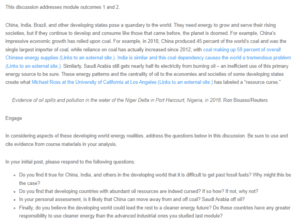Discussion – The Dilemma of the Developing World Energy
It will be difficult for high-energy-consuming developing nations like India and China to do away with it. India, for instance, heavily relies on coal-one of the dirtiest fossil fuels. Coal accounts for the country’s 70% of total energy production (Vaidyanathan, 2021). Overall, the two countries are the top producers and consumers of coal. India and China depend on fossil fuels for economic well-being. For instance, the coal industry in India employs about four million people (Vaidyanathan, 2021). Some people in coal-rich regions collect coal to make a living. Therefore, asking such people to abandon coal without offering alternatives is untenable. Also, China and India are highly populated, hence high energy demands. China has about 1.4 billion people, whereas India has about 1.3 billion people (Pascual & Zambetakis, 2010). Therefore, abandoning fossil fuels for these countries is untenable.
The resource curse in the oil sector explains the situation where developing countries endowed with oil tend to perform poorly economically than those that do not have oil endowments. Firstly, countries with oil endowments receive more income from oil exports (Kakanov et al., 2018). Accordingly, they ignore other sectors such as manufacturing. Also, countries with oil tend to access rent-seeking avenues, which weakens institutions. Governments in these countries know that they will receive regular revenue from oil sales (Kakanov et al., 2018). Consequently, other crucial institutions, such as the revenue collection bodies, are not empowered to collect revenue.
China’s prospects of moving off coals are high. The country is currently a leading party in green technology and a leading producer of wind turbines and solar energy. Also, China is a leader in producing rare earth elements (REE), crucial for producing clean energy (Pascual & Zambetakis, 2010). That shows that China has a high chance of moving off coal.
Developing nations are not responsible for leading the transition to clean energy. Firstly, the developed world has consumed dirty energy for too long to its advantage. Yet, developing countries have been hurt most by greenhouse and carbon emissions. Besides, the developing world is more concerned about lifting more people out of poverty instead of reducing foreign energy dependence or fossil fuel usage. Developing nations rely on cheap and dirty fossil fuels to feed their citizens; hence abandoning them is untenable.
References
Vaidyanathan, R. (2021, September 28). Climate change: Why India can’t live without coal. BBC News. https://www.bbc.com/news/world-asia-india-58706229
Pascual, C., & Zambetakis, E. (2010). The geopolitics of energy. Energy Security: Economics, Politics, Strategies, and Implications, 9-35.
Kakanov, E., Blöchliger, H., & Demmou, L. (2018). RESOURCE CURSE IN OIL EXPORTING COUNTRIES. https://www.oecd.org/officialdocuments/publicdisplaydocumentpdf/?cote=ECO/WKP(2018)59&docLanguage=En
ORDER A PLAGIARISM-FREE PAPER HERE
We’ll write everything from scratch
Question

Discussion – The Dilemma of the Developing World Energy
This discussion addresses module outcomes 1 and 2.
China, India, Brazil, and other developing states pose a quandary to the world. They need energy to grow and serve their rising societies, but if they continue to develop and consume like those that came before, the planet is doomed. For example, China’s impressive economic growth has relied upon coal. For example, in 2018, China produced 45 percent of the world’s coal and was the single largest importer of coal, while reliance on coal has actually increased since 2012, with coal making up 59 percent of overall Chinese energy supplies (Links to an external site.). India is similar and this coal dependency causes the world a tremendous problem (Links to an external site.). Similarly, Saudi Arabia still gets nearly half its electricity from burning oil – an inefficient use of this primary energy source to be sure. These energy patterns and the centrality of oil to the economies and societies of some developing states create what Michael Ross at the University of California at Los Angeles (Links to an external site.) has labeled a “resource curse.”
Evidence of oil spills and pollution in the water of the Niger Delta in Port Harcourt, Nigeria, in 2018. Ron Bousso/Reuters
Engage
In considering aspects of these developing world energy realities, address the questions below in this discussion. Be sure to use and cite evidence from course materials in your analysis.
In your initial post, please respond to the following questions:
- Do you find it true for China, India, and others in the developing world that it is difficult to get past fossil fuels? Why might this be the case?
- Do you find that developing countries with abundant oil resources are indeed cursed? If so how? If not, why not?
- In your personal assessment, is it likely that China can move away from and off coal? Saudi Arabia off oil?
- Finally, do you believe the developing world could lead the rest to a cleaner energy future? Do these countries have any greater responsibility to use cleaner energy than the advanced industrial ones you studied last module?

